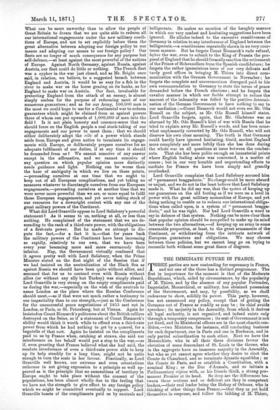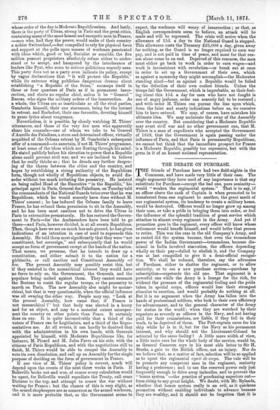THE IMMEDIATE FUTURE IN FRANCE.
THREE parties are now contending for supremacy in France, and not one of the three has a distinct programme. The first in importance for the moment is that of the Moderate Republicans, which, aided by circumstances, by the popularity of M. Thiers, and by the absence of any popular Pretender, Imperialist, Monarchical, or military, has obtained possession of the Government, and may, by possibility, as we shall endeavour to show, solidify its power. This party, however, has not announced any policy, except that of getting the Germans out of France as readily as may be ; its chief avoids speeches ; its majority in the Assembly, from which it derives all legal authority, is not organized, and indeed exists only through a temporary compromise ; its seat of Government is not yet fixed, and its Ministerial officers are in the most chaotic con- dition,—two Ministers, for instance, still conducting business for each department, one in Paris and one in Bordeaux, and in only partial subordination to each other. Next we have the Monarchists, who in all their three divisions favour the elevation of some descendant of St. Louis to the throne, who in the aggregate have an immense majority in the Assembly, but who as yet cannot agree whether they desire to elect the Comte de Chambord, and so terminate dynastic squabbles ; or the Comte de Paris, and so establish a Constitution, with a nominal King ; or the Dec d'Aumale, and so initiate a Parliamentary regime with, as his friends think, a strong per- manent Premier at its head. So deep are the differences be- tween these sections and so deficient are they in competent leaders,—their real leader being the Bishop of Orleans, who is thinking of other things than France,—that they as yet hold themselves in suspense, and follow the bidding of M. There, whose order of the day is Moderate Republicanism. And lastly, there is the party of Ultras, strong in Paris and the great cities, containing many of the most honest and energetic men in France, —men who, had they the power, would make of their country a nobler Switzerland,—but compelled to rely for physical force and support at the polls upon masses of workmen penetrated with ideas which, good or bad., Socialist or sensible, the five million peasant proprietors absolutely refuse either to under- stand or to accept, and hampered by the interference of leaders like Pyat, who seem to serious politicians scarcely sane. This party does not as a party even indicate its policy, except by vague declarations that "it will protect the Republic," while its extreme wing publishes dangerous dreams about establishing "a Republic of the Seine," encamps itself in three or four quarters of Paris as if in permanent insur- rection, and elects no regular chief, unless it be " General " Darras, who signs the military orders of the insurrection. As a whole, the Ultras are as inarticulate as all the rival parties, Gambetta himself, their one statesman, being for the instant in retreat, and Rochefort, their one favourite, devoting himself to prose lyrics about vengeance.
Nevertheless, it is possible, by closely watching M. Thiers' utterances, and those of the very few men who apparently share his counsels—one of whom we take to be General d'Aure]le des Paladines, a stern and determined officer, virtually acquitted of the Orleans retreat by M. Gambetta's subsequent offer of a command—to ascertain, if not M. Thiers' programme, at least some of the ideas which are floating through his mind. He stated publicly before his elevation to power that a Republic alone could prevent civil war, and we are inclined to_ believe that he really thinks so ; that he dreads any further deepen: ing of the chasm between the cities and the country, and hopes by establishing a strong authority of the Republican form, though not wholly of Republican objects, to avoid dis- order without too mach irritating the peasantry. He insisted on being called Head of the Executive "in the Republic," his principal agent in Paris, General des Paladines, on Tuesday told the commandants of the National Guards twice over that he was Republican, which he would scarcely have done without M. Thiers' consent ; he has induced the Orleans family to leave France, he has refused them permission to sit in the Assembly, and he has been most cautious not to drive the Ultras in Paris to extremities prematurely. He has restored the Govern- ment to Paris—for the Ambassadors have been told to go there—and Paris, however divided, is at all events Republican. Then, though here we are on much less safe ground, he has given indications of an intention in case of need to supersede this Assembly. He told them most significantly that they were "not constituent, but sovereign," and subsequently that he would accept no form of government except at the hands of the nation. That means, we presume, that he intends to draw up a constitution, and either submit it to the nation for a plebiscite, or call another and Constituent Assembly ad hoc. The present Assembly may possibly resist this, but if they resisted in the monarchical interest they would have no force to rely on, the Government, the Generals, and the populace being united against them. They cannot summon the Bretons to resist the regular troops, or the peasantry to march on Paris. The new Assembly also might be monar- chical, but that is very questionable, when the official influence was all swaying the other way. People may say, "Look at 'the present Assembly, how came that, if France is not monarchical ?" but that body was elected in a hurry and for an object, and may to a material extent misrepre- sent the country on otherpoints than Peace. It certainly aces on one. It is quite inconceivable that a third of the Voters of France can be Legitimists, and a third of the Repre- sentatives are. At all events, it can hardly be doubted that with the administration in his own hands, with Generals appointed by himself, with Moderate Republicans like, for instance, M. Picard and M. Jules Favre on his side, with the 'citizens of Paris Republican, and with the negotiations still to finish, M. Thiers would be able to compel the Assembly to vote its own dissolution, and call up an Assembly for the single purpose of deciding on the form of government in France. If our view of M. Thiers' policy is correct, much will depend upon the events of the next three weeks in Paris. If 'Belleville broke out and won, of course every calculation would be upset, for Belleville would repudiate the Treaty, call some Dictator to the top, and attempt to renew the war without waiting for France ; but the chance of this is very slight, as the armed shopkeepers are as numerous as the armed workmen, and it is more probable that, as the Government seems to expect, the workmen will weary of insurrection ; or that, as English correspondents seem to believe, an attack will be made and will be repressed. The crisis will arrive when the allowance of 15d. a day to the National Guard is stopped. This allowance costs the Treasury £25,000 a day, given away for nothing, as the Guard is no longer required to earn war pay, and is not paid in time of peace, and must for that rea- son alone come to an end. Deprived of this resource, the men must either go back to work in order to earn wages—and work is inconsistent with revolution—or break out at once in order to set up a Government of their own, which as against a monarchy they might accomplish—the Moderates standing aloof—but as against a Republic would be foiled by the defection of their own coolest friends. Unless the troops fail the Government, which is improbable, as their feel- ing about this 15d. a day for men who have not fought is one of angry jealousy, order can scarcely fail to be restored ; and with order M. Thiers can pursue the line upon which, from the faint and scanty indications before us, we conceive him to have entered. We may, of course, have mistaken his ultimate idea. We may underrate the away of the Assembly over the country. But considering that a Moderate Republic may avert civil war and no other government can, that M. Thiers is a man of expedients who accepted the Government of 1848, that the Government is again passing under the influence of Paris, and that Paris is permanently Republican, we cannot but think that the immediate prospect for France is a Moderate Republic, possibly too repressive, but with the germ in it of an honest national representation. .



































 Previous page
Previous page